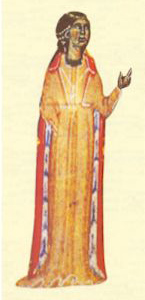
Back Trobadores Catalan Trobairitz German Trobairitz Spanish Trobairitz Basque Trobairitz French Trobairitz FRP Trobairitz Galician Trobairitz ID Trobairitz Occitan Trobairitz Portuguese

The trobairitz (Occitan pronunciation: [tɾuβajˈɾits]) were Occitan female troubadours of the 12th and 13th centuries, active from around 1170 to approximately 1260.[1] Trobairitz is both singular and plural.[2]
The word trobairitz is first attested in the 13th-century romance Flamenca.[3] It comes from the Provençal word trobar, the literal meaning of which is "to find", and the technical meaning of which is "to compose".[4] The word trobairitz is used very rarely in medieval Occitan, as it does not occur in lyrical poetry, grammatical treatises or in the biographies (vidas) of the trobairitz or troubadours.[5] It does occur in the treatise Doctrina d'acort by Terramagnino da Pisa, written between 1282 and 1296. He uses it as an example of a word the plural and singular of which are the same.[2]
Trobairitz composed, wrote verses, and performed for the Occitan noble courts. They are exceptional in musical history as the first known female composers of Western secular music; all earlier known female composers wrote sacred music.[6] The trobairitz were part of courtly society, as opposed to their lower class counterparts the joglaressas.[7] Although troubadours sometimes came from humble origins—Bernart de Ventadorn might have been the son of a castle's baker—the trobairitz were usually nobly born. The most important trobairitz were Alamanda de Castelnau, Azalais de Porcairagues, Maria de Ventadorn, Tibors, Castelloza, Garsenda de Proença, Gormonda de Monpeslier, and the Comtessa de Diá.
- ^ Schulman, Jana K. (2002). The Rise of the Medieval World 500–1300. Westport, Conn: Greenwood Publishing Group. pp. 111. ISBN 978-0-313-30817-8
- ^ a b Elizabeth W. Poe, "Cantairitz e Trobairitz: A Forgotten Attestation of Old Provençal »Trobairitz«," Romanische Forschungen, 114, 2 (2002), pp. 206–215, at 207: "which are correctly used only with flexional endings in all numbers ... trobayritz" (sol per us de parladura en totz los nombres ... trobayritz). Poe, 210, n. 15, notes that "TROBAIRITZ is the same in the singular and plural of all cases".
- ^ The Occitan scholar Pierre Bec incorrectly believed it to be a hapax legomena.
- ^ Bruckner 1995, xi The French phrase "bien trouvé" ("well found") still denotes an apt expression.
- ^ Paden
- ^ Kibler, William W. (1995). Medieval France: An Encyclopedia
- ^ Bruckner 1992
© MMXXIII Rich X Search. We shall prevail. All rights reserved. Rich X Search
